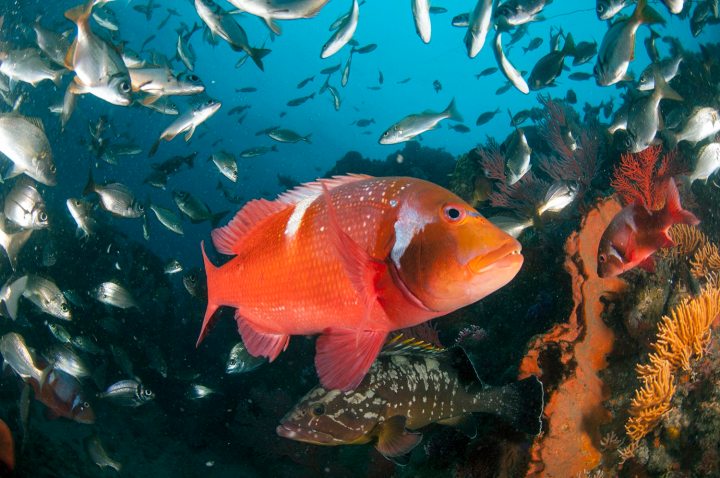Healthy Seas
Mining interests ‘stalling’ SA plans to protect more of the ocean

A global ocean protection group has expressed concern that plans to fast-track the expansion of Marine Protected Areas off the South African coast appear to have stalled.
Plans to enlarge South Africa’s protected ocean reserve network have come to a halt, allegedly due to pressure from the oil, gas and extractive mining sector.
This is the claim from Ocean Unite, a Washington DC based global ocean protection group headed by former University of Cape Town international environmental law graduate Karen Sack.
Sack, co-author of a 2013 scientific report which urged the United Nations to establish a new Department for Oceans and a new Interpol-style navy to police the high seas, has voiced disappointment that plans to fast-track the expansion of Marine Protected Areas(MPAs) off the South African coast appear to have stalled.
Sack said only 0.4% of the country’s Exclusive Economic Zone (EEZ) currently enjoyed legal protection. In 2014 the government had announced plans to expand this area of protected seas to 5% by 2016, increasing to a total of 10% by 2020.
“Unfortunately, this process has stalled with stakeholders raising concerns that this hiatus is owing to undue influence from the extractive mining sector which is seen as one of the main drivers for unlocking South Africa’s Ocean Economy”.
Sack did not identify any mining companies by name, but said it was significant that the Department of Energy had placed 98% of South Africa’s EEZ under acreage lease for oil and gas exploration or production rights, and there was also talk of new mining opportunities for phosphate extraction and other seabed minerals.
“Encouragingly, the drive to achieve a 10% (and more) MPA target appears well supported at the most senior levels in Department of Environmental Affairs and aligns with South Africa’s National Development Plan outcomes and international commitments at the United Nations. South Africa has recently assumed the role of Chair of the Indian Ocean Rim Association (IORA) and there is a timely opportunity for South Africa to lead the way to establishing MPA expansion as a key blue economy ocean governance goal within the African region.
“Marine parks are about more than just a haven for the species that live in them. These national parks at sea are critical climate change fighting tools and help support food security. The ocean is a massive carbon sink and science is now demonstrating that marine reserves slow the effects of climate change, rebuild biodiversity, and help build resilience. Governments can affirm their international commitments to combating climate change, securing jobs and food through the creation of marine reserves,” Sack said in a statement.
The Department of Energy has not responded to requests for comment on Sack’s claims about “undue influence” from mining interests.
However, former Ezemvelo KZN Wldlife senior marine scientist Dr Jean Harris said South African marine protection strategy currently ranked poorly compared to other nations.
“When South Africa’s current Marine Protected Areas (MPAs) were surveyed alongside 39 developed countries they ranked 34th out of 40, with 0.4% current marine protection, compared to an average of 11.2% for the other countries. When South Africa was surveyed together with 129 developing countries it ranked 90th out of 130 – an average of 5.8% compared to South Africa’s measly 0.4%,” said Dr Harris, who now heads the WildOceans programme of the Wildlands Conservation Trust.
She added that “0.4% is hopelessly inadequate to maintain sustainable benefits in a growing ocean economy. A minimum target agreed to as a global standard is 10% marine protection, with South Africa committing to achieving this by 2020.
“As an interim step, the Department of Environmental Affairs published intention to gazette 22 new/expanded MPAs to achieve a 5% target. This will also see benefits to fisheries, including protection of nursery and spawning areas, resource recovery and the management of essential fish habitat.”
By contrast, several other developing nations had announced much more ambitious MPA targets over the past year.
For example, she said, Brazil announced plans in March to create four new MPAs covering an area of more than 900,000 km2 – larger than France, England, Belgium, Netherlands and Switzerland combined.
In 2017, Mexico announced it would protect nearly 92,000 km2 of the ocean from fishing and resource extraction, while Chile had announced plans to protect over 1 million km2 of Chilean waters – more than 40% of its seas.
“This Latin American ocean protection leadership follows clear science that shows the importance of these national parks at sea to build resilience as well as revitalise the abundance and diversity of marine fish stocks.”
Closer to home, Harris said the Seychelles had also announced plans to protect 210,000 km2 of ocean and set a further goal of setting aside 16% of its waters for marine protection.
South Africa currently has a network of 24 coastal MPAs, covering only 0.4% of the continental EEZ (Exclusive Economic Zone), and one sub-Antarctic MPA (Marion/Prince Edward Islands). DM
Photo: Ocean scientists say Marine Protected Areas not only protect fish from over-exploitation, but can also help to slow the effects of climate change. All Photos: Steve Benjamin
















 Become an Insider
Become an Insider